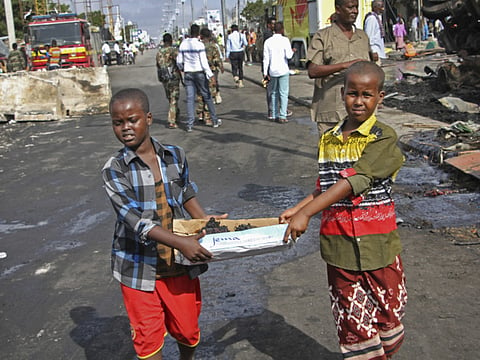As many as 100 could be dead in Mogadishu blast
Explosives-laden truck detonated at the entrance to the Safari Hotel

Mogadishu: The death toll from a massive truck bomb in Mogadishu that killed at least 20 people looked set to rise on Sunday as rescuers tried to recover bodies from the rubble, with medics warning it could climb as high as 100.
The blast took place on Saturday afternoon at a busy junction in the Somali capital, levelling buildings and causing widespread devastation in what was believed to be one of the worst-ever bombings in this war-torn country.
There has been no immediate claim of responsibility, but Al Shabab, a militant group aligned with Al Qaida, has carried out dozens of suicide bombings in its bid to overthrow Somalia’s internationally-backed government.
With at least 20 people killed and more than 200 wounded, half of them seriously, rescuers warned the toll could rise sharply as they continued their grim work of trying to retrieve bodies from under the rubble.
The explosion occurred at a junction in Hodan, a bustling commercial district which has many shops, hotels and businesses in the city’s northwest.
Shortly after the blast, a police source told AFP more than 20 bodies had been recovered from the streets but warned there were “many more under the wreckage of buildings destroyed by the blast”.
And on Sunday, ambulance service chief Abdul Kadir Haji Aden told AFP the final toll could be as high as 100.
“The number of dead is over 100 and the wounded reaches several hundreds,” said Aden who runs the city’s main Aamin ambulance service.
“All trauma hospitals in Mogadishu are full of the patients from the blast. What happened yesterday was an unprecedented tragedy here.”
Security official Abdul Kadir Muktar said that so far, the final number of dead was unclear but that hundreds of people had been either wounded or killed in the blast.
“The government is still working to establish the exact number of innocent people who were killed and or wounded in the horrible and ruthless incident,” he said, noting that there were hundreds of people in the area when the bomb went off.
“This is believed to be the biggest blast and it went off ... (at) a densely-populated intersection so you can imagine the magnitude of casualties it could cause.”
As the rescue work continued, Somali President Mohammad Abdullahi Mohammad, better known as Farmajo, declared a three days of mourning as he visited the attack site and then met with some of the wounded at a nearby hospital.
Medics at the hospital told him they had treated around 205 patients, half of them whom were in serious condition, he said in a televised address to the nation.
“Today’s incident was a horrible attack carried out by Al Shabab against innocent civilians that was not aimed at specific Somali government targets,” he said.
“This shows how these violent elements are ruthlessly and indiscriminately targeting innocent people who were busy minding their own business.”
Government officials said the blast was caused by an explosives-laden truck which was detonated at the entrance to the Safari Hotel.
Although it was a popular hotel, it was not one frequented by government officials — which have often been targeted by Al Shabab militants.
In any case, the devastation caused was widespread. Muhidin Ali, a Mogadishu resident who was close by at the time said it was, “the biggest blast I have ever witnessed, it destroyed the whole area.”
“We did not sleep last night and worked with rescue workers,” said Abdul Risak Mohammad, one of the owners of a building that was destroyed, saying he believed there were still bodies under the rubble.
Qatari Foreign Minister Shaikh Mohammad Bin Abdul Rahman Al Thani wrote on Twitter that the country’s embassy had been badly damaged in the blast and one of its top officials wounded.
Meanwhile, the National Union of Somali Journalists said a freelance cameraman, Ali Nur Siyaad, had been killed and four other journalists wounded in the explosion.
Al Shabab was forced out of the capital six years ago by African Union and Somali troops, and subsequently lost control of major towns across southern Somalia.
However, the militants continue to control rural areas and launch attacks on military, government and civilian targets in Somalia, as well as terrorist raids in neighbouring Kenya.
Saturday’s blast came two days after Somalia’s defence minister and army chief both resigned from their posts without explanation.



